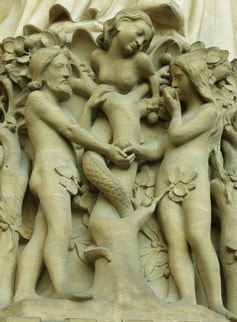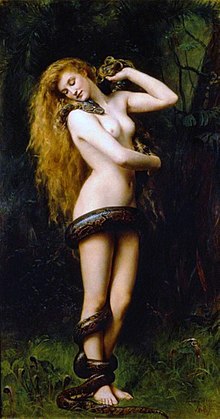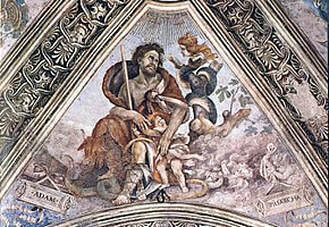|
Heini-Sofia Alavuo is a Finnish journalist currently living in Greece. She likes to tell stories and make people think - the world is so full of interesting tales, facts and humans. Twitter: @heinialavuo Note: I was surprised to realize how many different kind of myths and versions there are of Lilith in the ancient texts, so it’s good to clarify that this article mainly talks about the tale of Lilith as Adam’s first wife. Without a doubt there’s much more to learn about this fascinating character. The bible tells us that after God had created Earth, its seas winds and mountains, on the sixth day he created man and woman. According to biblical doctrine, all humans share these same ancestors, Adam and Eve. If Eve had not listened to the snake and sinned, we would all still be living in paradise. Why is it that women always seem to ruin everything, in stories written by men? Mercifully, Eve is not the only nasty woman in the creation mythology. According to Jewish tradition, Adam had an ex – Lilith, his first wife. In Genesis 1, God creates both man and woman, but later in Genesis 2 he creates them again, only this time he creates the man first and the woman from the man’s body. A lesser known interpretation of this script is that God created another woman before Eve. This woman isn’t named in the Bible, but medieval Jewish scholars identified her as Lilith – the demonized female character that has had various roles in ancient Judaism texts.  The story goes: The first time God created man and woman he created both of them from the dust of the earth. To God’s devastation they immediately started fighting with each other – when it was time for them to lay together Lilith told Adam she didn’t want to be underneath him. This made Adam mad, and he insisted the woman to obey. Lilith disagreed, because they were created from the same dust, as equals. Adam didn’t listen, so Lilith shouted out loud the true name of God, raised up in the air and disappeared in the sky. ([Alphabet of Sirach] light adaptation Pulakka 2018) It seems that Eve was created from Adam’s rib just so that she wouldn’t be as difficult as the first wife. From the modern point of view Lilith could be praised as a feminist icon – she dared to say no to a man, and even God himself. She demanded equality and walked away from the relationship after she had had enough. Then why hasn’t her story received more attention amongst women who are demanding equality today? The problem lays in the complex infamy of the character. Firstly, in the ancient Babylonian texts, Lilith seems to be depicted as a winged female demon, who attacks pregnant women and infants. She appears only once in the Bible, in Isaiah 34:14, as one of the demons haunting the destroyed Kingdom of Edom. (Sauter, 2018)  Lilith (1887) by John Collier in Southport Atkinson Art Gallery Lilith (1887) by John Collier in Southport Atkinson Art Gallery According to Jewish folklore, Lilith is fierce, seductive female demon, mischievous lady of the night. Talmud, one of the holy books of Judaism, mentions Lilith couple of times. For instance, it gives a word of warning to men, and young boys especially, not to sleep alone at their house. It was told that men sleeping alone will easily get targeted by Lilith’s nightly tricks - accidental nightly ejaculations were a sign of Lilith’s vicious visits. (Pulakka, 2018) Lilith seems to be held responsible for many deplorable or unexplainable occurrences, such as wet dreams, menarche, miscarriages or the high rate of infant mortality. Blaming a demon goddess probably helped people at ancient times to cope with things they couldn’t control. (Gaines, 2018) Obviously Lilith hasn’t been depicted as the most pleasant female character and her attitude towards children only strengthens the image of a reckless, cruel woman: When Lilith had disappeared from the paradise Adam started to cry and told God that the woman who was created for him had disappeared. God decided to send three angels to look for Lilith, and they were supposed to deliver the following message: if Lilith would come back willingly, everything would be all right and her impudence would be forgiven – but if Lilith would refuse to return, she would lose 100 of her children, every day, from this day to eternity. The angels found Lilith in the middle of the Red Sea, where she was mating with demons. When Lilith heard God’s order, she decided to rather kill infants than return. In order to not be drowned in the sea she promised to spare all the children named after these three angels. ([Alphabet of Sirach] light adaptation Pulakka 2018) Some scholars have pointed out that these texts from Alphabet of Sirach were satirical, so the true nature of Lilith can’t be objectively analysed here. While reading many other texts and versions of Lilith it seems to be clear, though, that she has always been intentionally associated with things bad and evil - in all the ancient texts Lilith has been demonized. This is common for many other mythological women who refused to submit to men, like for example the brave Amazons. (Pulakka, 2018) As Adam’s first wife, Lilith is shown as an example of what happens if a woman is not obedient. Some interpretations even claim that Lilith came back to paradise as a snake and persuaded Eve to sin – double the blame on her. It’s hard not to see the story of Lilith as Adam just bitching about his ex – of course she was horrible, who could ever stand a woman who doesn’t find you superior. Maybe Adam even invented the rumours of a baby-killer sex maniac to keep her from returning to the paradise. (Gaines, 2018) It’s salient to point out that these tales were written by men and for men, and no one ever listened to Lilith’s side of the story – maybe she wasn’t as selfish as told. I’m not going to defend a baby-killer, but in all fairness, God’s punishment was bit childish (pun intended). Maybe Lilith was just strong enough not to obey and give up to blackmail, although the price she paid for her freedom was horrible. She never even achieved the equality she longed for. These old texts are a good example of how women were viewed and sometimes still are - as root of all evil if not contained. Lilith is an exaggerated warning of what women will become if you give them too much freedom. Confident and sexual women seem to be demonized even today, and let’s not even talk about how our society treats women who don’t like babies. This is why I think Lilith could be considered as a role model for feminists today. She didn’t choose to be a nasty demon woman, and her story teaches us that standing up for yourself isn’t always easy – even in our time consequences can be harsh. Freedom is still worth it, though, and one day we will all be equal.
Reference list
1 Comment
|
Sex History ContentsIf you would like to submit an article, please fill out a submission on the Contact page Archives
September 2020
|

 RSS Feed
RSS Feed